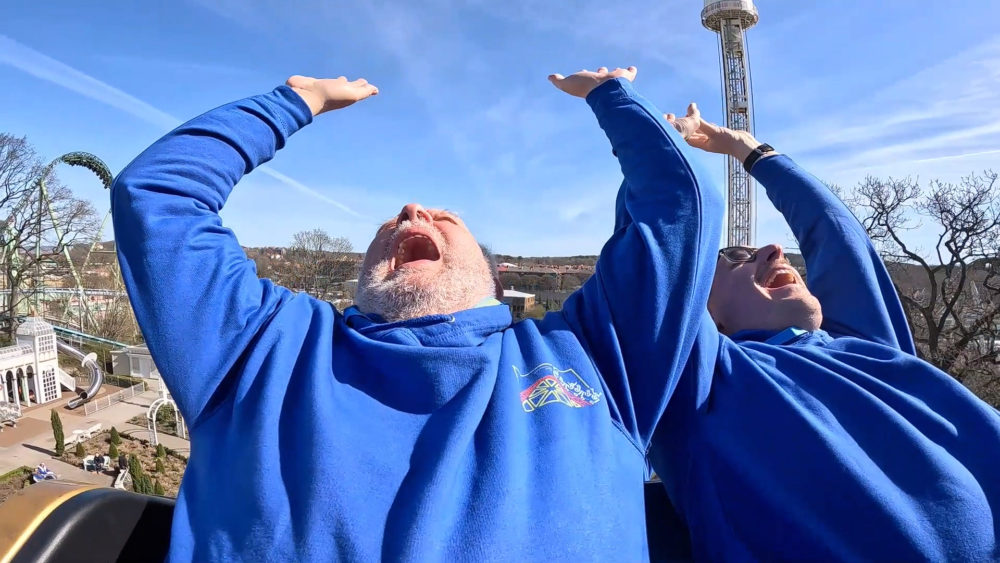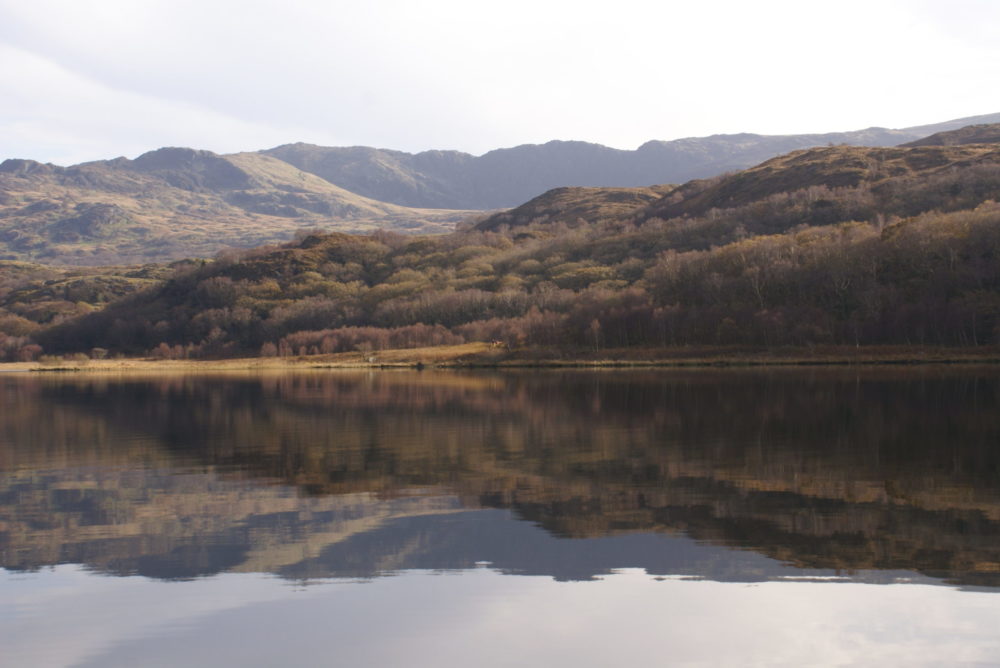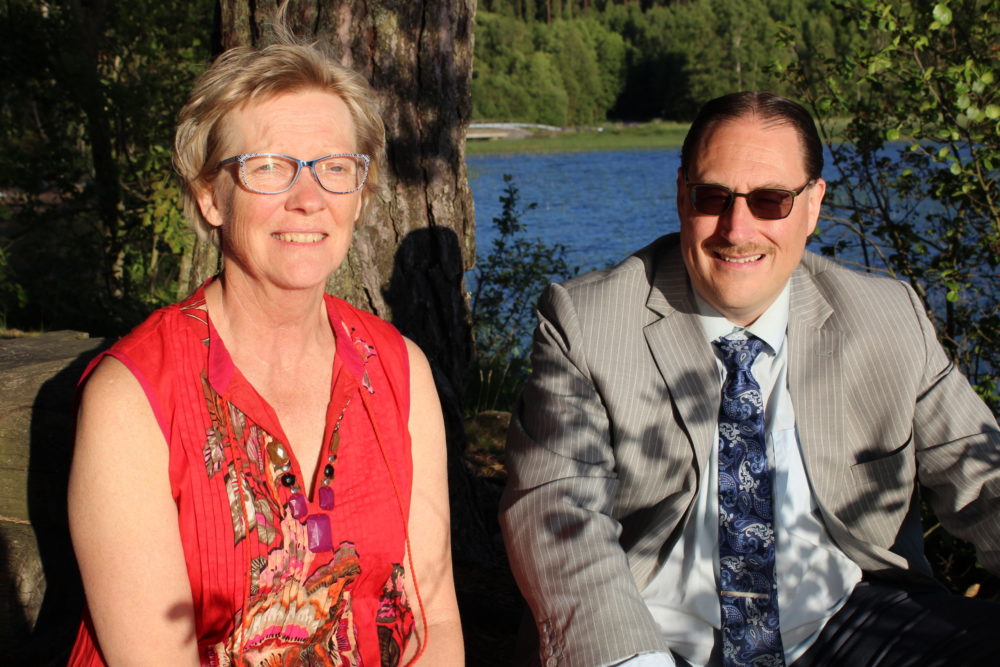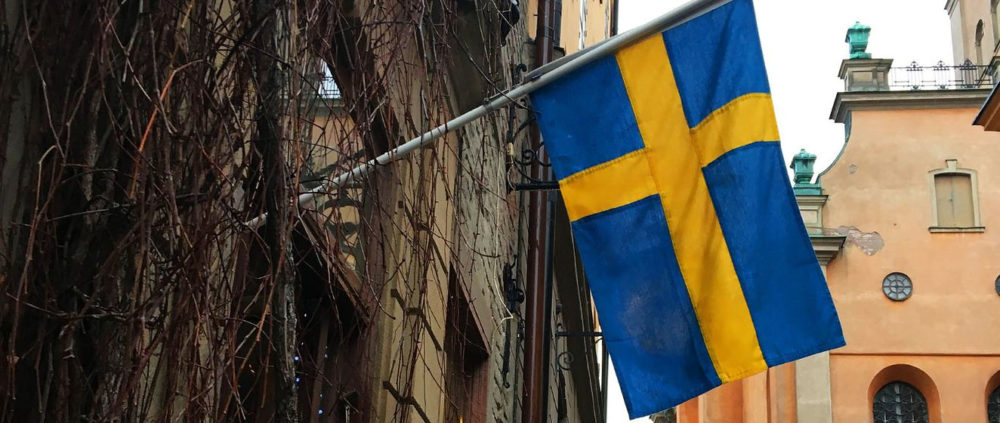My, my! A Welsh learner from Sweden

Stephen Price
Martin Kahnberg from Överlida in Sweden is a rollercoaster loving song composer who began learning Welsh after trying to pronounce words from The Dark is Rising by Susan Cooper.
Martin has an MSc in Computer Science, a degree in Church Music, and a BA in English Linguistics and is currently studying language history.
A few months ago, he completed a musical that he’d been working on ever since 1998 while studying for a maths exam – so you’d think he’d have enough on his plate. But you’d be wrong!
Martin is also an avid Welsh learner, and in June of this year, he will be taking part in a choir trip to Llandudno. He told us: “I don’t know much about the choir, but how could I possibly turn down an offer of a choir trip to Wales?”
Another of his hobbies is riding rollercoasters. To date, he’s ridden 263 different coasters in Europe and last summer, he finally got to ride the Green Dragon coaster at Greenwood family park / Gelli Gyffwrdd, here in Wales.
As part of our ongoing feature on Welsh learners abroad, we caught up with Martin earlier this month to find out about his language journey.
From the beginning…
This is actually a long story, starting with me reading Susan Cooper’s ‘The Dark is Rising’ when I was 14.
I had read Tolkien’s ‘Lord of the Rings’ a few months earlier and tried my best to figure out how to pronounce the words used in those books – so when Susan Cooper started introducing loads of Welsh words in the 4th book of the series, I simply had to figure out how to pronounce those words as well.
7 years later (back in 1999) we had been on a family trip to Ireland, and the ferry arrived in Caergybi 2 hours too early.
The bus stopped in Llanfair PG, and of course I spent some time trying to figure out how to pronounce the name… Then the bus drove through Eryri on a perfectly clear day, and I was completely awestruck by the beauty around us.
I knew I had to return one day. The tour guide told us that this was an area where Welsh was spoken – so of course I wanted to learn how to say “good morning” and “thank you” before I returned (I always try learning a few words or phrases in the local languages whenever I visit another country).
Well, it took me 4 years to find someone who could help me find a website where I could start learning Welsh, and I used that website for 11 years before I found a chance to revisit Wales in 2014.
I had made it into the national golf team of the Swedish Church, and we would play the Church of England outside Fleet. I realised I could get a few extra days off, so I hired a car and visited Devon before the match days and then had 3 days in Wales after.
I managed to find some CDs with Welsh music (both choir songs and folk songs), and I was delighted when I realised that it was possible to visit Welsh choir rehearsals. One of the choirs I loved on the CDs was Morriston Orpheus, and they would be rehearsing on the Wednesday evening when I would be in the south.
Go West
On the Thursday evening the Brythoniaid was rehearsing, and I found an awesome YouTube video of them singing the Pet Shop Boys song “Go west” so of course I had to visit that rehearsal.
On the Friday evening, Côr Bro Meirion were planning to rehearse, and I thought it could be interesting to hear a mixed choir as well. Well – it turned out that Morriston Orpheus welcomed me when they heard that we “had beat the English”, and I was warmly welcomed at the rehearsals in the north because I tried learning the Welsh language – but when I tried using the word I had learnt for “thank you” (which I pronounced “die-oltch”, because there were no pronunciation guidelines on the website I had used) they didn’t understand that I was trying a Welsh word…
One of the choristers told me about the BBC Big Welsh Challenge, so I started using it.
When I revisited Wales two years later my Welsh had improved, and I made friends in the Morriston Orpheus and in the Brythoniaid.
One of the friends in the Brythoniaid was first language Welsh, and as time went on my goal shifted from “learning a bit of Welsh to show my support for the language and culture” to “hoping to one day manage a 5 minute chat all in Welsh with a friend”.
Goals
When visiting the Eisteddfod in 2023, I managed to use nothing but Welsh for 12 hours (twice, actually). I want to improve enough so that I can switch more easily into Welsh whenever the chance arrives, and I want to avoid using English when chatting with people who know Welsh (and hopefully they won’t feel the urge to swap to English because my Welsh is too slow/bad).
Using English with first-language Welsh speakers just seems weird to me – why use a language that is second/foreign to both of us when we can use a language that is native to one of us?
It would be great to spend a full week in Welsh using no other language than Welsh – I know I would manage, as long as the others are supportive.
Visits to Wales
I’ve visited Wales in 1999 (a couple of hours), 2014 (3 days), 2016 (2 days), 2017 (14 days), 2018 (8 days), 2019 (6 days) and 2023 (13 days), and I will be back in June 2024.

I’d love to relocate to north west Wales, but unfortunately there’s no chance whatsoever of me ever being able to afford such a move due to the house prices. I live in a 160 square meter detached house with an acre of land here in Sweden, but that house is worth less than £40000.
If I would sell it I wouldn’t even be able to afford buying a small flat in Wales.
But IF I would be able to afford the move one day I’d really love to become a member of one or two Welsh choirs (Welsh-language choirs, preferably) – I’ve already had offers from Welsh choirs wanting me to join them, but it’s not much use joining when I’m only able to attend 1-2 rehearsals a year….. But the Welsh choirs are so good, and the members are incredibly friendly – so IF the chance ever comes I’ll definitely go for it!
Learning Welsh
I’m really enjoying learning Welsh. The more I learn, the more I love the language.
The hardest part of learning Welsh is that there aren’t any methods to learning Welsh through the medium of Swedish.
Given that my understanding of English grammar and idioms is quite limited, I struggle to find people who can explain Welsh grammar and Welsh idioms in a way that a foreigner can grasp – having them explained using English counterparts usually don’t help me much.
In the “Dwi’n dysgu Cymraeg” group on facebook there are a few who can add German examples when explaining Welsh stuff, and those examples are wonderful.
Having learned several foreign languages in the past (English from age 10, German from age 13, Spanish age 16-19, Italian age 19-20) I’ve worked up my own strategy when it comes to learning a foreign language.
Many of the European languages share parts of the grammar, so now I’m mainly trying to get used to the peculiarities of each grammar and get those patterns into my body (the rest will work anyway).
When I finally found a way to learn Welsh pronunciation (BBC Big Welsh Challenge was really helpful in this process back in the days when Flash could still be used) I realised that Welsh pronunciation was simpler than German and Spanish pronunciation – not to mention how simple it was compared to Swedish and English pronunciation!
If I see a Swedish or English word written that I’ve never encountered before I have no idea whatsoever as to how it’s supposed to be pronouced, and spelling in those two languages is equally tricky.
Consistency
In Welsh, I know how to pronounce unknown written words, and I know how to spell unknown spoken words – even when I don’t know what those words mean.
I also love how Welsh words all link back to stems, so that I can get an idea of what a word might be about just from recognising the stem of another word being used in that new word as well (like “cof”, “cofio”, “anghofio”, “cofrestr” and “mewngofnodi” all link to memory).
I’ve used loads of different methods when learning.
From the start I used that website and later found some books for learning Welsh – but so far I haven’t found any good printed resource.
There are a few printed resources on grammar, but given how simple and logical the Welsh grammar really is I haven’t spent much time reading the grammar books that I have.
I wish that someone would write a “useful” book for learners, a book combining simple stories, vocab, pronunciation and grammar step by step as you progress further and further into the book (and then a sequel and a third…) – a proper book for learning Welsh as a foreign language on your own.
BBC Big Welsh Challenge
I’ve used BBC Big Welsh Challenge (a lot), DuoLingo (a lot, back in the old days when it was still mentored by the volunteers who created the course in the first place), SaySomething in Welsh, and university courses given at the university in Uppsala (Sweden) (three courses, mynediad+sylfaen).

I’ve also attended several online chat sessions hosted by Richard Morse (one of the volunteers who built the original DuoLingo course), and I’m currently one of ten in a canolradd chat group through Prifysgol Bangor.
I’ve also attended the Norfolk chat group, as they have online sessions. But the best way of learning Welsh is really to spend some time in Wales and try using the language in the wild.
It’s possible that I have an advantage of being a Swede, but nowadays I start every conversation I have in Wales in Welsh – and if the other tries swapping to English I sometimes say (in Swedish) that I don’t speak much English and then ask them (in Welsh) to swap back to Welsh… A bit annoying, I guess – but sometimes the result is that learners try using what Welsh they have in order to communicate with the intriguing Swede who doesn’t speak much English…
So really – “go for it” is the best strategy.
Out in the wild
I don’t get as much time to use my Welsh as I would like… There aren’t many Swedes who speak Welsh, but I try making most of my facebook posts trilingual (Swedish – Welsh – English).
I speak Welsh to myself daily, and I try writing a sentence or two in Welsh every day. I sing in Welsh every day, because at least half of the songs I listen to on Spotify are in Welsh. But I’d love to speak Welsh daily (for hours).
Welsh music
There are so many great Welsh artists/bands, and getting to know and love Welsh music has been one of the most important parts of my learning journey.
The first I found through the various artists CDs that I bought – “4 yn y bar”, “John ac Alun” (who also played live at the Eisteddfod!).
Many of them I’ve found on YouTube when searching for Welsh songs with lyrics (Caneuon Cymraeg efo geiriau) – Bryn Fon, Sobin a’r Smaeliaid, Plethyn, Tswnami, Cowbois Rhos Botwnnog, Celt, Candelas, Meinir Gwilym, Daniel Lloyd a Mr Pinc, Dafydd Iwan, Brigyn…
I found Rhys Meirion when watching “Deuardau Rhys Meirion” on S4C when visiting Wales back in 2017, and that led me to make a mixed Swedish+Welsh version of Caradog Williams’ “Gwinllan” (which appeared on Deuardau Rhys Meirion in a great version by Rhys and Bryn Fon).
I’ve lost count on the number of times Eva-Karin and I have performed that Swedish+Welsh version live here in Sweden.
Some of them I’ve found when asking around – “Crys”, “Alffa”…
One of them I found at the Eisteddfod last summer – Pedair.
Some of them I’ve found through the Spotify Daily mix – Calfari, Mellt. (It’s actually quite interesting to get a daily mix with several Welsh language songs combined with a few of my own…
World Song Festival
I’m a member of the World Song Festival jury, where I’m asked to help finding good Welsh languages songs released that year, but it’s been hard to find the songs quickly enough…
I only found out in November that Crys had released a new single (a good one!) in 2022, so I couldn’t nominate it for the WSF 2023 (and it’s too old to participate in WSF 2024).
It’s always tricky to rank bands, but my top 5 would be this: Crys, Plethyn, Pedair, Sobin a’r Smaeliaid, Celt. I definitely listen to all those 5 bands every week.
I used to watch S4C every day back in 2016-2017, when they still allowed me to watch the programs from Sweden using VPN.
A few of my favourite things…
1 – That the beautiful Welsh language is used
2 – The wonderful friendliness I encounter everywhere in Wales
3 – That the Welsh love singing, and that they don’t look down on people who sing (the way people in Sweden do, unless you’re one of the 5 top stars)
4 – The storytelling that everyone in Wales seem to be so great at
5 – The great stories set in Wales – myths, legends, modern stories
6 – That they’ve managed to keep the Welsh language alive this far, despite all the despicable things that the English have done to suppress it
Some final thoughts…
Apart from the fact that people don’t use the Welsh language as the default language when greeting strangers, I love everything about Wales, the Welsh language and the people living in Wales.
I just wish they would do more to make sure that the beautiful language is really used in schools, the streets, in the shops and everywhere else every day.
If every conversation would be started in Welsh the ones not speaking Welsh would be the ones having to swap (with an excuse that they don’t speak the language).
The way it is today (when English is used as the default greeting) the ones who don’t speak Welsh can keep their life in English without having to apologise at all for not speaking the local language (for not even bothering to learn), while Welsh speakers need to ask permission to speak their language (which really ought to be THE language in Wales).
Everyone can learn a few basic phrases in Welsh – and everyone visiting Wales ought to do it.

In Sweden, you’re not allowed to stay for more than 2 years without attending the “Swedish for foreigners” course, and a similar concept ought to be used in Wales as well.
It might not make people fluent Welsh speakers, but at least it would make Welsh the every day language in Wales.
And it’s definitely not rude to speak Welsh – I’d say it’s actually rude not to check whether a stranger might speak Welsh.
I’ve heard several Welsh residents who say that they have friends whom they’ve known for 10 years and where English is the language used in conversation even though both speak Welsh – and that’s simply insane.
Click here to find out more about SaySomethingInWelsh.
Click here for more info on DuoLingo.
Click here for information on local Wales-based Welsh classes or London classes (Not exhaustive so please check social media and search engines for what’s on in your area)
Support our Nation today
For the price of a cup of coffee a month you can help us create an independent, not-for-profit, national news service for the people of Wales, by the people of Wales.





